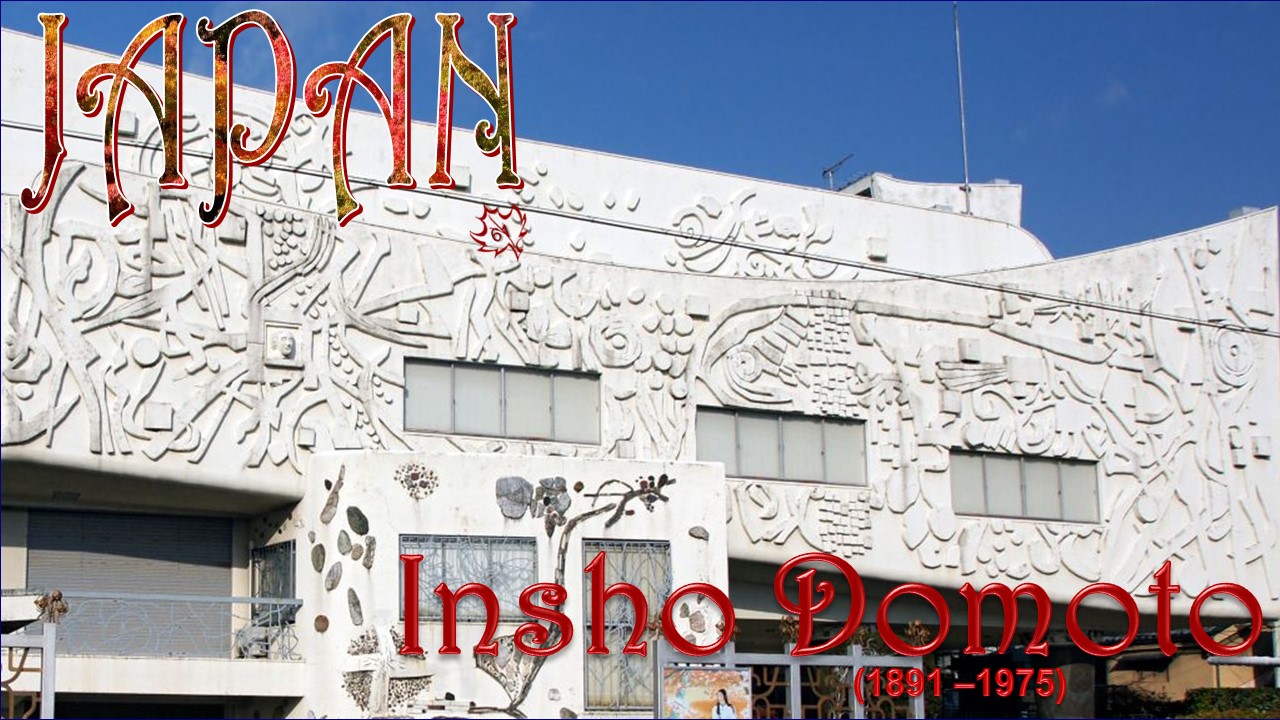Insho Domoto (Japan, 1891-1975) Japan 61 - PowerPoint PPT Presentation
Title:
Insho Domoto (Japan, 1891-1975) Japan 61
Description:
Insho Domoto (1891 - 1975) was a Japanese artist. His birth name was Sannosuke Dōmoto. He was a recipient of the Order of Culture in 1961. Insho cultivated a strong interest in history, aesthetic theory, and Western art from the Old Masters to Cubism and Kandinsky. He started Nihonga, but later turned to oil paintings including religious artworks. By the work of mural painting of church he was awarded the "Order of St. Sylvester" from Curia Romana in 1963. Then after the end of the 1950s he started the Nihonga Abstract Paintings, also he painted them on old Kyoto temples' sliding door = Fusuma – PowerPoint PPT presentation
Number of Views:2
Title: Insho Domoto (Japan, 1891-1975) Japan 61
1
JAPAN
Insho Domoto
(1891 1975)
2
Formerly the Imperial capital of Japan for more
than one thousand years, Kyoto is known as the
thousand-year capital. It has a population close
to 1.5 million. Insho Domoto (1891 - 1975) was a
Japanese artist. His birth name was Sannosuke
Domoto. He was a recipient of the Order of
Culture in 1961. Insho cultivated a strong
interest in history, aesthetic theory, and
Western art from the Old Masters to Cubism and
Kandinsky. He started Nihonga, but later turned
to oil paintings including religious artworks. By
the work of mural painting of church he was
awarded the "Order of St. Sylvester" from Curia
Romana in 1963. Then after the end of the 1950s
he started the Nihonga Abstract Paintings, also
he painted them on old Kyoto temples' sliding
door Fusuma
3
In 1966 the artist established Domoto Museum of
Fine Arts to display his works of art by his
design
4
The Insho Domoto Museum of Fine Arts is located
in northwestern Kyoto
5
The museum is located across the street from
Ritsumeikan University in northwest Kyoto. It is
close to the Golden Pavilion and Ryoanji Temple
6
The museum building was designed by Domoto himself
7
(No Transcript)
8
(No Transcript)
9
Doors
10
Gamelan
11
(No Transcript)
12
(No Transcript)
13
(No Transcript)
14
Virtually all of the building is made up of
Domoto's works including the walls, door knobs,
stained glass windows, and chairs for resting. It
could be said that the art museum itself is a
work of art
15
(No Transcript)
16
(No Transcript)
17
Paris 1952
18
Rome 1952
19
1952
The collection covers Domoto's life works from
his first work to his most famous works produced
in his later years
20
Paris 1952
Daily Life -1955
21
(No Transcript)
22
Landscape of Fukakusa, southern Distinct Kyoto
-1919
23
Cormorant Fishing 1923 The National Museum of
Modern Art, Kyoto
24
Daimonji-yama
Cherry Blossoms at Night in Maruyama Park, from
the album Eight Views of Kyoto (Kyôto hakkei)
Cherry Blossoms in Rain at Arashiyama
25
Chinese bell flower
Kingfisher and Reed
26
Mount Fuji
Slope (Image of Gojo-zaka) -1924
27
Deer 1930
28
Village Scenery 1950
Morning-Glories 1942 The National Museum of
Modern Art, Tokyo
29
Winter Morning MoMATokyo
Nandin
30
1957
1968
Puppet Master 1950
31
Self-portrait
My father
32
Scene of the tea ceremony 1948
33
Dressing the Hair for New Year's Day
(8 Views of Kyoto) Maiko
34
Owl 1962
35
Two 1945
36
Tenacity 1963 The National Museum of Modern Art,
Tokyo
37
Ohara me from the album Eight Views of Kyoto
(Kyôto hakkei)
38
Autumn Maple Leaves at Takao Hyogo Prefectural
Museum of Art In Kobe
39
Kinkaku-ji in Snow, from the album Eight Views of
Kyoto (Kyôto hakkei) 1950
40
Fukakusayama Treasure Ship
The year Todaiji 1925
The Imperial Palace in Snow
41
Nursing Mother's Prayer for Milk 1924
42
Road in the mountain
43
Symphony 1961
44
Domoto produced works using a variety of painting
styles from orthodox Japanese-style paintings
featuring nature to abstract paintings that evoke
memories of Picasso. Visitors can sense this
ever-changing nature from his body of work
45
Wind God -1961
46
(No Transcript)
47
Sliding doors Fusuma
48
(No Transcript)
49
White Hawk (Hakutaka)
Auspicious wind blowing through pines 1940
50
Auspicious wind blowing through pines 1940
51
(No Transcript)
52
(No Transcript)
53
Insho's Preparatory Drawings for Fusuma Paintings
Chishaku-in Temple
54
Fusuma Paintings Chishaku-in Temple
55
Triptych of Buddhist Saint Vimalakirti 1923
56
Hariti 1922 MoMAK
Six Avalokitesvaras (Kanzeon) 1937
57
Princess Konohanasakuya -1929
58
Birth of prince Shotoku1947
59
Cat 1922
60
Hares playing in the Spring Field 1938
61
Locks 1951
62
A Family 1949
63
Newspaper The National Museum of Modern Art,
Kyoto
64
Eight hours 1951
65
Suspicion 1954
66
The Insho-Domoto Museum of Fine Arts holds an
annual exhibition which takes a historical look
at work that arose from art schools in Kyoto
Metro 1953
67
Hunting expedition
68
Ripened fruits 1930
Spring 1927
69
Pomegranates 1920
70
Snow
71
Study for Garasha Hosokawa, wall painting in
Tamatsukuri Cathedral 1962
Study for Ukon Takayama wall painting in
Tamatsukuri Cathedral 1962
72
Beginning and Ending of Destiny (Annunciation)
1954
73
The Cross
Study for Maria wall painting in Tamatsukuri
Cathedral 1962
74
Beginning and Ending of Destiny (Pieta) 1954
75
The Insho Domoto Museum was founded in 1966, and
houses the works of Insho Domoto. In addition,
there are periodic exhibits
76
Text pictures Internet Copyright All the
images belong to their authors Presentation
Sanda Foisoreanu
2016
Sound Memoirs of a Geisha - Music
composed and conducted by John Williams,
featuring cello solos by Yo-Yo Ma and
violin solos by Itzhak Perlman































